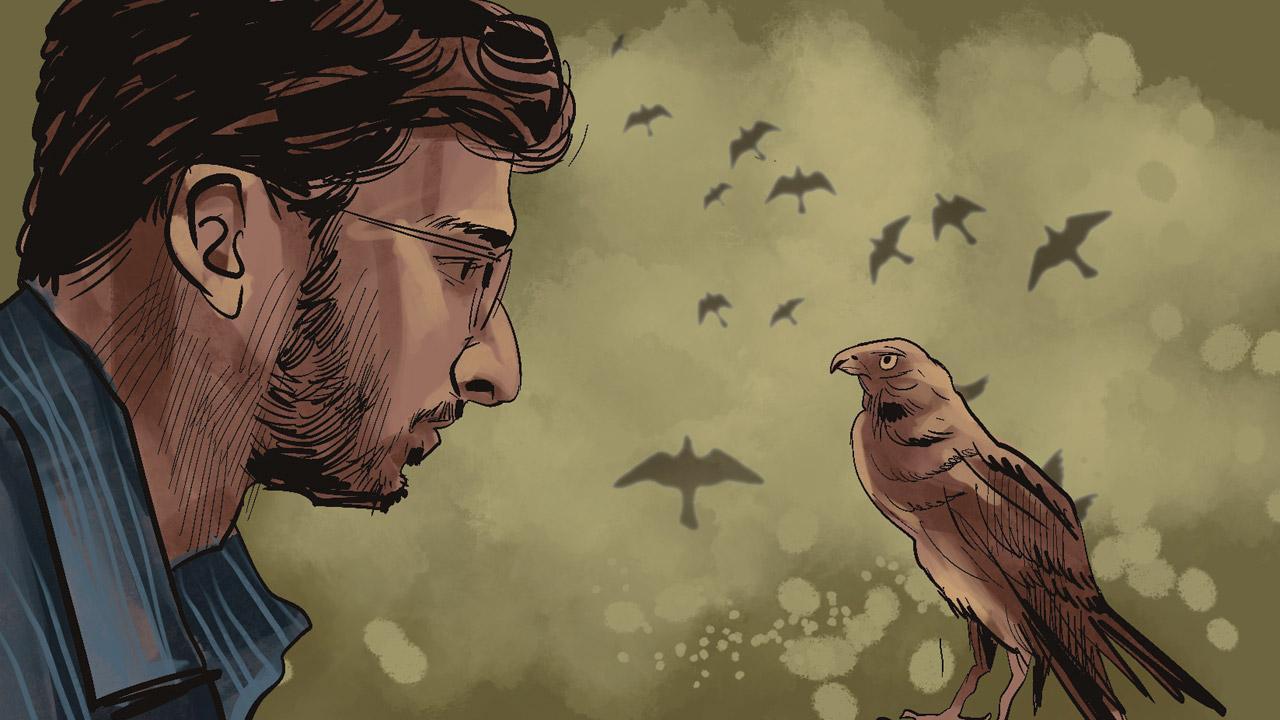Sen’s producers include Teddy Leifer, Aman Mann, Florrie Priest and Sen himself, with funds from several nations

Illustration/Uday Mohite
![]() Shaunak Sen’s magnificent and courageous documentary All That Breathes has won the Grand Jury Prize in the World Cinema Documentary Competition at the Sundance Film Festival. The film is many things at once—a deeply political, philosophical, environmental, poetic, compassionate, funny and moving documentary, that is a clear-eyed, gutsy comment on today’s right-wing India. It follows the two brothers, Nadeem Shehzad and Muhammad Saud, and their colleague Salik Rehman, who have devoted their lives to saving cheel—black kites, the regal birds—increasingly falling from the skies, thanks to Delhi’s pollution, and injury by manja (kite string). They have saved over 20,000 birds from a makeshift bird clinic in the basement garage of their modest home in Wazirabad, North Delhi. The kites, raptors, are their buddies: they eat meat from their hands; a naughty kite even expertly swoops and steals Salik’s spectacles off his face, without a whiff of a scratch.
Shaunak Sen’s magnificent and courageous documentary All That Breathes has won the Grand Jury Prize in the World Cinema Documentary Competition at the Sundance Film Festival. The film is many things at once—a deeply political, philosophical, environmental, poetic, compassionate, funny and moving documentary, that is a clear-eyed, gutsy comment on today’s right-wing India. It follows the two brothers, Nadeem Shehzad and Muhammad Saud, and their colleague Salik Rehman, who have devoted their lives to saving cheel—black kites, the regal birds—increasingly falling from the skies, thanks to Delhi’s pollution, and injury by manja (kite string). They have saved over 20,000 birds from a makeshift bird clinic in the basement garage of their modest home in Wazirabad, North Delhi. The kites, raptors, are their buddies: they eat meat from their hands; a naughty kite even expertly swoops and steals Salik’s spectacles off his face, without a whiff of a scratch.
Sen is drawn to fascinating stories of the marginalised. His debut documentary feature Cities of Sleep (2015), is also a superb docu on how Delhi’s homeless must pay the ‘sleep mafia’ to sleep on its pavements or road dividers, that was at the Dok Leipzig and other festivals. His All That Breathes is a prime example of how indie and docu filmmakers will find a voice that can be heard worldwide, even if the government shuts down all key film institutions (why bother with film, when you can manufacture consent with mere WhatsApp videos?). Sen’s producers include Teddy Leifer, Aman Mann, Florrie Priest and Sen himself, with funds from several nations.
When the brothers first took an injured kite to a bird hospital, they were turned away because it was a “non-veg bird,” and decided to treat it themselves. They explain how meat-tossing (feeding birds) earns sabab (religious credit); how their mother told them stories as children of Billi Baba (a cat saint) and a giddhon ki mazhar (a vulture shrine). “One shouldn’t differentiate between all that breathes,” one of the brothers says.
So compassionate are they, one says: “This male kite has an ‘egg indentation’ in his belly, from keeping their eggs warm…Release him fast because his chicks will be waiting in the nest.” The opening shots show the filth that India’s capital lives in, moving to mountains of garbage, open sewers, toxic foam floating on the Yamuna river, with foraging pigs, cows, goats, turtles, rats, flies, mosquitoes and more. We are reminded how kites eat rats and help keep our cities clean. “I don’t save kites, the kites save us,” one of the brothers says.
The survival of the kites is a metaphor, linked to the survival of the Muslim minority in India’s toxic, right-wing atmosphere. All around the brothers, Muslim homes and shops are being burnt, mosques destroyed and gruesome religious riots continue. Yet, the brothers are stoic about the horrors, even philosophical. Consumed by their obsession for healing birds, the brothers, who run a soap dispenser business, scarcely have time to join the anti-CAA (Citizenship Amendment Act) protests, opposing the move to make Muslims refugees in their own country. “Imagine, a spelling mistake is making us refugees” one brother says, referring to his father’s HSC certificate. “Now it is not just hatred, but disgust,” Nadeem adds. “By calling us [Muslims] termites and rats, they have made it about hygiene.”
“Will you go to Pakistan or Bangladesh?” the wife asks matter-of-factly. The film is elevated by the brothers’ exquisite, everyday poetry on the kites: the “sust-sa til aasman mein,” (lazy dot-in-the-sky), or “You don’t care for things because they share the same country, religion or politics. Life itself is kinship. We’re all a community of air,” Saud says.
After the New York Times wrote about them, their NGO Wildlife Rescue is able to get some funding; even as they expand to terrace cages, Nadeem goes to the Lees McRae College in the US to study international bird rescue further, while Saud manages the hospital alone.
The direction is absolutely assured, with top notch tech credits. German cinematographer Ben Bernhard favours slow pans that reveal a lot, aided by Riju Das and Saumyanand Sahi. Editor Charlotte Munch Bengtsen (Joshua Oppenheimer’s The Act of Killing) and co-editor Vedant Joshi (The Disciple) do a superb job intercutting parallel metaphors, yet playful. Niladri Shekhar Roy’s sound design and Roger Goula’s music greatly enhance the film.
Meenakshi Shedde is India and South Asia Delegate to the Berlin International Film Festival, National Award-winning critic, curator to festivals worldwide and journalist.
Reach her at meenakshi.shedde@mid-day.com
 Subscribe today by clicking the link and stay updated with the latest news!" Click here!
Subscribe today by clicking the link and stay updated with the latest news!" Click here!








